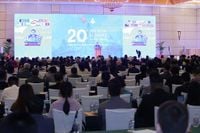SIEM REAP – The 20th Asia Media Summit (AMS) opened on July 22, 2025, in Cambodia’s historic Siem Reap province, drawing media leaders and policymakers from 26 countries across Asia and the Pacific for an urgent conversation on the evolving media landscape. Under the theme “Celebrating Two Decades of Excellence & Beyond,” the summit highlights the dual challenges and opportunities presented by rapid technological advancements, particularly artificial intelligence (AI), alongside the escalating threat of disinformation and fake news.
Minister of Information Neth Pheaktra delivered a keynote address that captured the paradox at the heart of today’s media environment. “We are living in a world of paradox,” he said. “We are more connected than ever before, yet we’re also more fragmented. Information is everywhere, but public trust is eroding.” His words underscored the complexity of a digital age where technology has empowered citizens to amplify their voices but simultaneously opened floodgates for disinformation, hate speech, and algorithmic bias.
Pheaktra did not shy away from addressing regional tensions, notably condemning certain Thai media outlets for spreading “fake news” aimed at damaging Cambodia’s international reputation. Speaking ahead of the summit, he accused these outlets of deploying a “dirty strategy” to distort facts amid ongoing border disputes. “We clearly see that the other party, which has issues with us, consistently uses fake news, disseminated through their own media networks, to distort, exaggerate, and twist the truth with a clear intention to mislead the world about Cambodia,” he said. The Ministry of Information also confirmed that Thailand did not send representatives to the summit, a notable absence amid these accusations.
Despite these challenges, Pheaktra praised the digital revolution for democratizing content creation and expanding journalism’s reach. Cambodia itself has undergone a remarkable transformation over the past two decades, evolving from a post-conflict nation with limited media outlets to a modern country boasting a diverse media ecosystem that includes television networks, print media, radio, digital platforms, and citizen journalists.
To combat the dark side of this digital expansion, Cambodia launched a nationwide “Say No to Fake News” campaign in April 2025. This initiative combines civic education, fact-checking partnerships, media monitoring, and grassroots outreach, aiming to reach all 25 provincial capitals by March 2026. “The campaign is designed to enhance public media literacy, strengthen journalistic ethics, and equip our citizens to distinguish between information and manipulation,” Pheaktra explained during the summit.
He emphasized that fighting disinformation is not a task for governments alone. “It requires a shared commitment—by journalists, civil society, educators, tech companies, and ordinary citizens,” he said, highlighting the importance of collective action rooted in shared values, technological collaboration, and principled multilateralism.
Philomena Gnanapragasam, Secretary-General and CEO of the Asia-Pacific Institute for Broadcasting Development (AIBD), echoed this sentiment, warning that fake news has morphed from isolated incidents into a global crisis. “Not only eroding public trust, but also affecting democracy, health and social stability,” she said. “Media literacy, fact-checking, and mutual cooperation are key pillars in overcoming this dilemma.”
Gaurav Dwivedi, President of AIBD, spotlighted AI’s transformative role in the media industry, noting that AI-powered tools are reshaping content production, newsroom workflows, and audience engagement. “They enable automatic content curation, enhance fact-checking, and help personalize viewer experiences,” he said. Dwivedi revealed that some newsrooms have already begun piloting AI-driven solutions to automate content curation and improve accuracy, allowing journalists to focus more on storytelling.
However, the summit also confronted the risks AI poses, such as deepfake manipulation, data bias, and the automated spread of misinformation. In response, Minister Pheaktra proposed initiating discussions on a joint regional charter for AI ethics in journalism. “One that upholds transparency, fairness and respect for human dignity,” he suggested, emphasizing the necessity of human-centered values guiding technological advances.
ASEAN Secretary-General Kao Kim Hourn, who addressed the summit via video, reflected on the rapid digital transformation across the region and the evolving flow of information. He highlighted the challenges of information fragmentation and echo chambers, while underscoring ASEAN’s commitment to media and digital literacy, especially empowering youth as agents of positive change. “By engaging young people and holding online platforms to high standards, ASEAN can strengthen its efforts to counter disinformation and build a more informed, responsible, and resilient regional community,” he said.
The summit culminated in the adoption of the “Second Angkor Declaration” and “Declaration Against Fake News 2.0,” signaling a collective regional commitment to tackle the growing threat of fake news, particularly AI-driven disinformation. Cambodia’s Ministry of Information, alongside partners, continues to support the digital transition of the country’s media institutions through national journalism training, infrastructure investments, and collaborations with technology firms and journalism schools. These efforts also promote the inclusion of women and youth in media leadership roles and aim to balance freedom of expression with responsibility through thoughtful regulatory frameworks.
Despite the hurdles, the atmosphere at AMS 2025 was one of cautious optimism. Pheaktra reflected on Cambodia’s journey and the broader regional media evolution, noting the summit is “more than just a conference – it is a movement, a platform, and a beacon.” He urged media professionals to recommit to journalism’s fundamental purpose. “The future of media is not just about speed or innovation — it is about values,” he said. “In an era where virality often trumps veracity, we must re-anchor media in its fundamental purpose: to inform, to empower, to inspire and to unite.”
As the summit continues through July 24, participants remain focused on forging stronger international cooperation to protect information integrity and public trust in a world where misinformation threatens to drown out the truth. The 20th Asia Media Summit in Siem Reap stands as a pivotal moment for the Asia-Pacific media community to confront these challenges head-on and chart a path toward a more transparent, ethical, and resilient media future.

